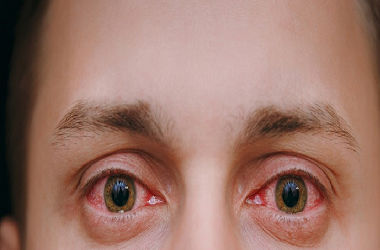General Health
Medications To Treat Conjunctivitis
7 min read
By Apollo Pharmacy, Published on - 03 August 2023
Share this article
0
0 like

Conjunctivitis, also known as pink eye, is a common condition that affects the conjunctiva, the thin clear tissue that covers the white part of the eye. It can be caused by viruses, bacteria, allergies, or irritants. Conjunctivitis is highly contagious and spreads easily through direct contact or touching contaminated surfaces. However, timely intervention can help alleviate symptoms, reduce discomfort, and prevent complications. Let us know about the medications used to treat the different types of conjunctivitis.
Over-the-counter (OTC) Medications for Conjunctivitis
Over-the-counter (OTC) medications are the ones that can be taken without consulting a doctor. These medications are convenient and cost-effective in treating conjunctivitis.
1. Artificial Tears (Lubricating Eye Drops)
Artificial tears, also known as lubricating eye drops, are designed to mimic the natural tears produced by our eyes and can provide relief from symptoms associated with conjunctivitis.
Purpose and benefits
The purpose of artificial tears is to lubricate the eyes and relieve dryness, irritation, and redness caused by conjunctivitis. They can also help flush out any foreign particles or allergens that may be causing the inflammation.
2. Antihistamine Eye Drops
Antihistamine eye drops can be a valuable tool in managing symptoms caused by allergic conjunctivitis.
Purpose and benefits
Antihistamine eye drops are specifically formulated to relieve itching, redness, and swelling associated with allergic conjunctivitis. They help to reduce the release of histamines, which in turn alleviates allergy symptoms in the eyes. These eye drops provide fast-acting relief and can provide long-lasting comfort throughout the day.
3. Decongestant Eye Drops
Decongestant eye drops are a specific type of eye drop that can be effective for allergic conjunctivitis.
Purpose and benefits
These eye drops work by narrowing the blood vessels in the eyes, which helps to reduce redness and swelling. By alleviating these symptoms, decongestant eye drops can provide relief and improve the overall comfort of the affected individual.
Prescription Medications for Conjunctivitis
Prescription medications play a crucial role in alleviating symptoms and accelerating the healing process.
1. Antibiotic Eye Drops/Ointments for Bacterial Conjunctivitis
Antibiotic eye drops or ointments contain medications that help kill bacteria and treat the infection.
Commonly prescribed antibiotics in India
Some commonly prescribed antibiotics in India for bacterial conjunctivitis include:
- Ciprofloxacin
- Moxifloxacin
- Ofloxacin
- Chloramphenicol
- Gentamicin
2. Antiviral Eye Drops/Ointments for Viral Conjunctivitis
Antiviral eye drops or ointments are specifically designed to combat viral conjunctivitis. These medications target the underlying viral infection and help relieve discomfort.
Commonly prescribed antivirals in India
Some of the commonly prescribed antiviral eye drops include:
- Acyclovir: It is an antiviral agent that inhibits the replication of viruses, including those responsible for causing conjunctivitis. Acyclovir eye ointment or cream is typically applied to the affected eye(s) multiple times a day for a specified duration.
- Ganciclovir: This antiviral medication is effective against certain types of viruses that cause conjunctivitis. It is usually prescribed as eye drops and should be used according to the instructions provided by your healthcare professional.
3. Combination Medications for Conjunctivitis
Combination medications for conjunctivitis typically consist of a steroid and an antibiotic. Steroid-antibiotic combination eye drops/ointments contain both anti-inflammatory and antibacterial effects, making them highly effective in treating various forms of conjunctivitis.
The benefits of these eye drops include:
- Reducing inflammation: The steroid component helps to decrease inflammation in the eyes, relieving redness, swelling, and discomfort.
- Inhibiting bacterial growth: The antibiotic component helps to kill or inhibit the growth of bacteria that may be causing the infection.
- Providing quick relief: Combination medications can provide rapid relief from symptoms, helping you feel better faster.
How to Use the Eye Drops/ Ointments?
Simple steps that can increase the efficiency of these eye drops include:
- Wash your hands thoroughly before and after applying the eye drops to prevent further contamination.
- Use a clean tissue or cotton swab to gently wipe away any discharge or crust from the affected eye before instilling the eye drops.
- Tilt your head back slightly and pull down your lower eyelid to create a pocket for the eye drops.
- Squeeze the prescribed number of drops/ ointment into the pocket created by your lower eyelid and then close your eyes gently for a few seconds to allow the medication to spread evenly.
- Typically, you will be advised to apply the medication directly to your eyes multiple times a day. Stick to your doctor's advice.
- The duration of treatment can vary depending on the severity of the infection, but it generally ranges from a few days to a week.
Potential Side Effects and Allergic Reactions of Conjunctivitis Eye Drops
Some common side effects of these eye drops may include:
- Temporary stinging or burning sensation
- Blurred vision
- Increased sensitivity to light.
While these side effects usually subside on their own, if you experience severe pain, persistent redness, worsening vision, or any unusual symptoms after using the eye drops, stop using them immediately and consult your healthcare provider.
When to Seek Medical Help?
Consult a doctor if:
- Your symptoms worsen or do not improve after a few days of using the eye drops.
- You experience severe pain, vision changes, or other concerning symptoms.
- You have any questions or concerns about using the medication.
Home Remedies and Self-Care Tips for Conjunctivitis
Some of the common home remedies for conjunctivitis include:
- Apply a warm compress to your eyes for 5-10 minutes, several times a day. This can help reduce inflammation and relieve discomfort.
- Identify and avoid any triggers that may be causing or worsening your conjunctivitis. Common allergens include dust, pollen, pet dander, and certain chemicals.
- Wash your hands regularly with soap and water to prevent the spread of infection.
- Avoid touching or rubbing your eyes, as this can further irritate the condition.
Prevention of Conjunctivitis
In addition to medications, there are several preventive measures you can take to reduce the risk of conjunctivitis:
- Wash your hands frequently with soap and water, especially after coming into contact with someone who has conjunctivitis.
- If someone in your household has conjunctivitis, avoid sharing towels, pillows, or other personal items.
- In some cases, vaccination may be available to prevent certain types of viral conjunctivitis, such as adenoviral conjunctivitis. Consult with your healthcare provider to know if vaccination is recommended for you.
Conclusion
Conjunctivitis is a common and treatable condition that can be caused by various factors such as bacterial or viral infections, allergies, or irritants. Medications play a crucial role in managing and resolving conjunctivitis symptoms effectively. While antibiotic eye drops are commonly used for bacterial infections, antiviral and anti-allergy eye drops are prescribed for viral conjunctivitis and allergic conjunctivitis, respectively. Furthermore, by taking the prescribed medications and practising good hygiene, you can alleviate symptoms and promote a speedy recovery.
FAQs
Q. How long does it take for conjunctivitis eye drops to work?
The effectiveness of eye drops can vary depending on the individual and the type of infection. In some cases, improvement may be seen within a few days, while in others, it may take longer.
Q. Are there any side effects of using eye drops for conjunctivitis?
Side effects may vary depending on the type of eye drop used. Common side effects include temporary stinging or burning sensation, blurred vision, or mild irritation. If you experience severe or prolonged side effects, consult your healthcare provider.
Q. Can children use conjunctivitis eye drops?
Children can use conjunctivitis eye drops, but it is important to consult a paediatrician for appropriate dosage and administration.
Q. How often should I use conjunctivitis eye drops?
Follow the instructions provided by your healthcare provider or pharmacist. Typically, eye drops are used several times a day for a specific duration.
Q. Can I use over-the-counter eye drops for conjunctivitis?
It is recommended to consult a healthcare professional before using any medication. They can determine the most appropriate treatment based on the cause and severity of your conjunctivitis.
General Health
Consult Top Opthalmologists
View AllLeave Comment
Recommended for you

General Health
5 Home Remedies for UTI
The most common way to treat urinary tract infections (UTIs) is by consuming antibiotics. However, should a person consume these drugs without considering other measures? In simple words, not really. One can try proven home remedies to get quick relief from UTI. This blog explains some practical steps to follow after an unwanted UTI episode.

General Health
How To Treat Ear Pain In Children
Discover effective ways to treat ear pain in children. Learn about common causes, the latest guidelines, and lifestyle factors that can help alleviate discomfort.

General Health
Top 9 Protein-Rich Foods For Muscle Building
Explore the ultimate list of protein-rich foods that fuel muscle growth and keep you full. Discover a balanced approach to fitness and satisfaction.
Subscribe
Sign up for our free Health Library Daily Newsletter
Get doctor-approved health tips, news, and more.
Visual Stories

Plant-based Foods That Are a Great Source of Iron
Tap to continue exploring
Recommended for you

General Health
5 Home Remedies for UTI
The most common way to treat urinary tract infections (UTIs) is by consuming antibiotics. However, should a person consume these drugs without considering other measures? In simple words, not really. One can try proven home remedies to get quick relief from UTI. This blog explains some practical steps to follow after an unwanted UTI episode.

General Health
How To Treat Ear Pain In Children
Discover effective ways to treat ear pain in children. Learn about common causes, the latest guidelines, and lifestyle factors that can help alleviate discomfort.

General Health
Top 9 Protein-Rich Foods For Muscle Building
Explore the ultimate list of protein-rich foods that fuel muscle growth and keep you full. Discover a balanced approach to fitness and satisfaction.